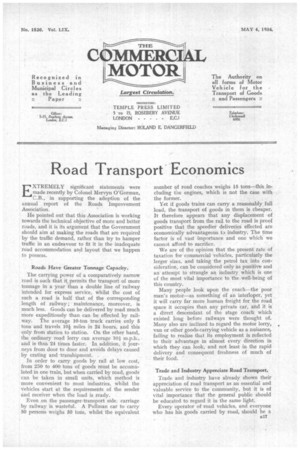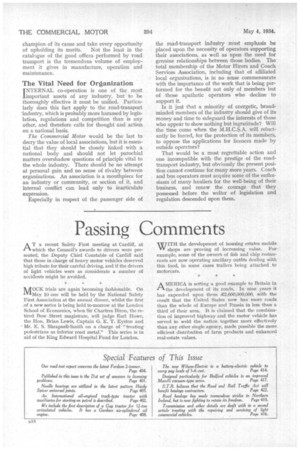Road Transport Economics
Page 31

Page 32

If you've noticed an error in this article please click here to report it so we can fix it.
EXTREMELY significant statements were made recently by Colonel Mervyn O'Gorman, GB., in supporting the adoption of the annual report of the Roads Improvement Association.
He pointed out that this Association is working towards the technical objective of more and better roads, and it is its argument that the Government should aim at making the roads that are required by the traffic demand, rather than try to hamper traffic in an endeavour to fit it in the inadequate road accommodation and layout that we happen to possess.
Roads Have Greater Tonnage Capacity.
The carrying power of a comparatively narrow road is such that it permits the transport of more tonnage in a year than a double line of railway intended for express service, whilst the cost of such a road is half that of the corresponding length of railway ; maintenance, moreover, is much less. Goods can be delivered by road much more expeditiously than can be effected by railway. The average 10-ton truck carries only 5 tons and travels 10i miles in 24 hours, and this only from station to station. On the other hand, the ordinary road lorry can average 101 m.p.h., and is thus 24 times faster. In addition, it journeys from door to door and avoids delays caused by crating and transhipment. .
In order to carry goods by rail at Tow cost, from 250 to 400 tons of goods must be accumulated in one train, but when carried by road, goods can be taken in small units, which method is more convenient to most industries, whilst the vehicles start at the requirements of the sender and receiver when the load is ready.
Even on the passenger-transport side, carriage by railway is wasteful. A Pullman car to carry 50 persons weighs 50 tons, whilst the equivalent number of road coaches weighs 15 tons—this including the engines, which is not the case with the former.
Yet if goods trains can carry a reasonably full load, the transport of goods in them is cheaper.
It therefore appears that any displacement of goods transport from the rail to the road is proof positive that the speedier deliveries. effected are economically advantageous to industry. The time factor is of vast importance and one which we cannot afford to sacrifice.
We are of the opinion that the present rate of taxation for commercial vehicles, particularly the larger sizes, and taking the petrol tax into consideration, can be considered only as punitive and an attempt to strangle an industry which is one of the most vital importance to the.well-being of this country.
Many people look upon the coach—the poor man's motor—as something of an interloper, yet it will carry far more human freight for the road space it occupies than any private car, and it is a direct descendant of the stage coach which existed long before railways were thought of. Many also are inclined to regard the motor lorry, van or other goods-carrying vehicle as a nuisance, failing to realize that its employment is reflected to their advantage in almost every direction in which they can look, and not least in the rapid delivery and consequent freshness of much of their food.
Trade and Industry Appreciate Road Transport.
Trade and industry have already shown their appreciation of road transport as an essential and valuable service to the community, but it is of vital importance that the general public should be educated to regard it in the same light.
Every operator of road vehicles, and everyone who has his goods carried by road, should be a s17 champion of its cause and take every opportunity of upholding its merits. Not the least in the catalogue of the good offices performed by road transport is the tremendous volume of employment it gives in manufacture, operation and maintenance.
The Vital Need for Organization
INTERNAL co-operation is one of the most important assets of any industry, but to be thoroughly effective it must be unified. Particularly does this fact apply to the road-transport Industry, which is probably more harassed by legislation, regulations and competition than is any other, and therefore calls for thought and action on a national basis.
The Commercial Motor would be the last to decry the value of local associations, but it is essential that they should be closely linked with a national body and should not let parochial matters overshadow questions of principle vital to the whole industry. There should be no attempt at personal gain and no sense of rivalry between organizations. An association is a mouthpiece for an industry or community, or section of it, and internal conflict can lead only to inarticulate expression.
Especially in respect of the passenger side of the road-transport industry must emphasis be placed upon the necessity of operators supporting their associations, as well as upon the need for genuine relationships between those bodies. The total membership of the Motor Hirers and Coach Services Association, including that of affiliated local organizations, is in no sense commensurate with the importance of the work that is being performed for the benefit not only of members but of those apathetic operators who decline to support it.
Is it just that a minority of energetic, broadminded members of the industry should give of its money and time to safeguard the interests of those who appear to show nothing but ingratitude? Will the time come when the M.H.C.S.A. will reluctantly be forced, for the protection of its members, to oppose the applications for licences made by outside operators?
That would be a most regrettable action and one incompatible with the prestige of the roadtransport industry, but obviously the present position cannot continue for many more years. Coach and bus operators must acquire some of the enthusiasm of many hauliers for the well-being of their business, and renew the courage that they possessed before the welter of legislation and regulation descended upon them.




























































































